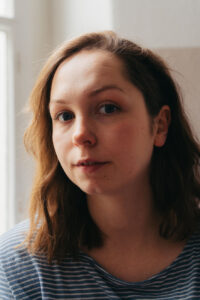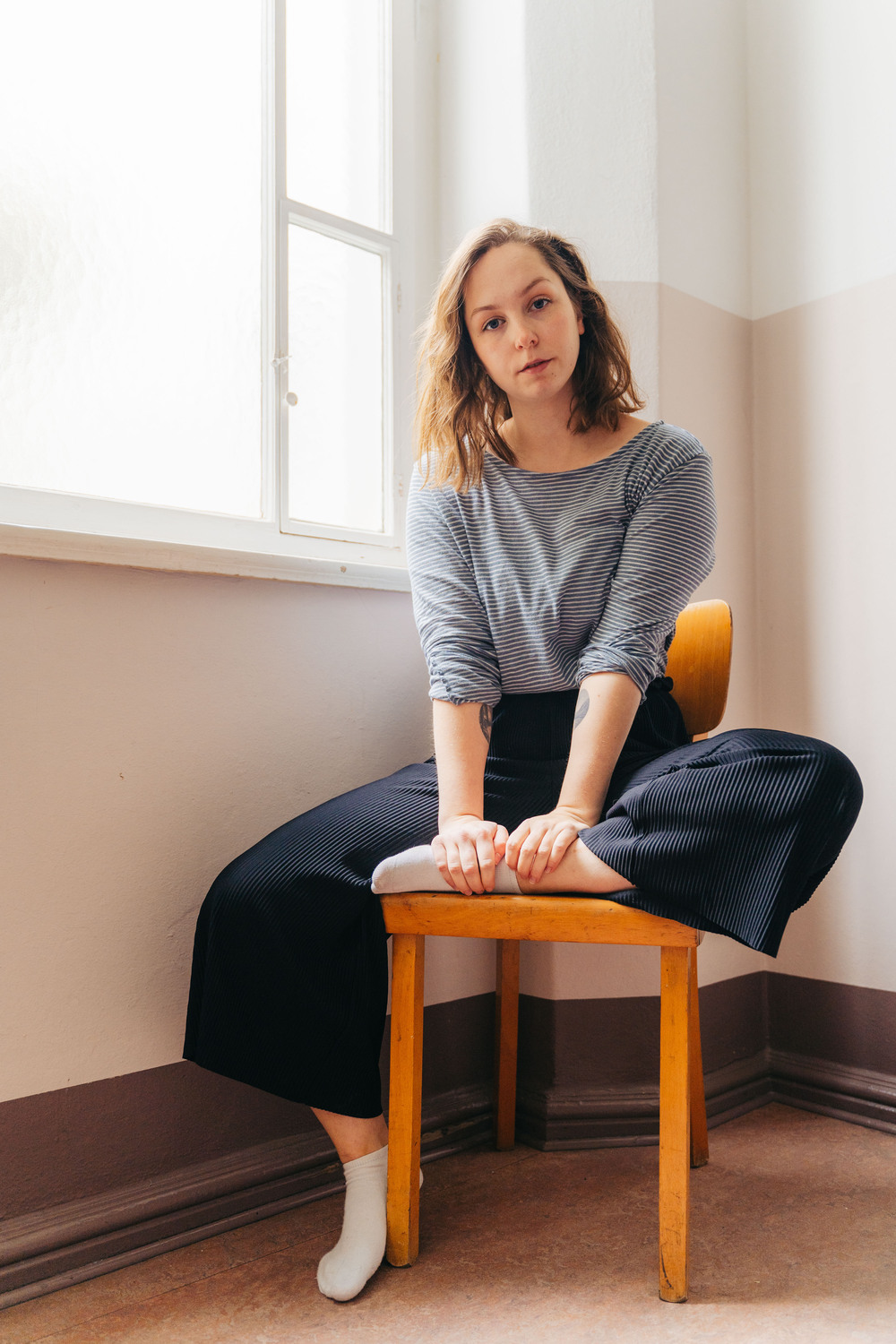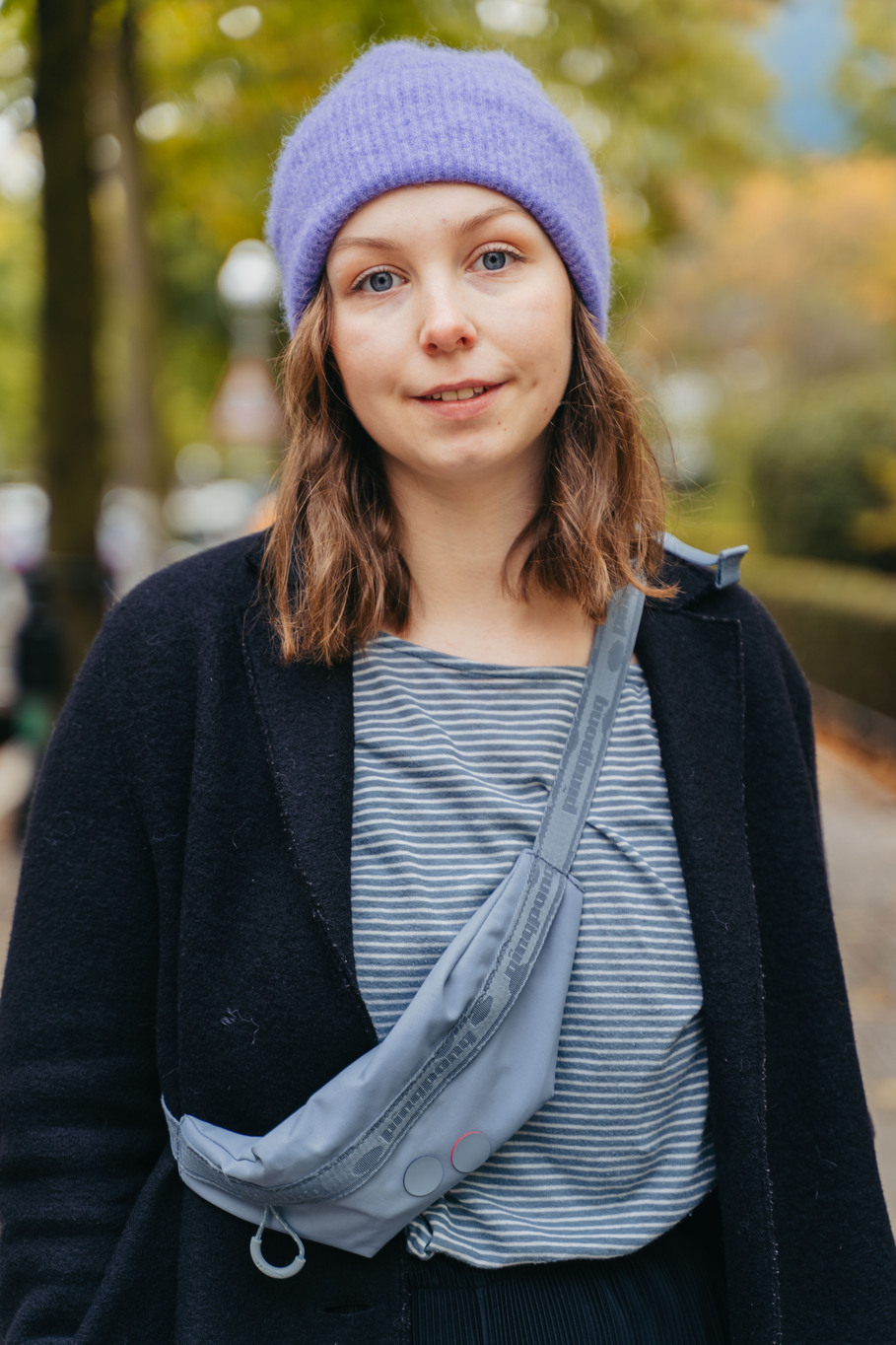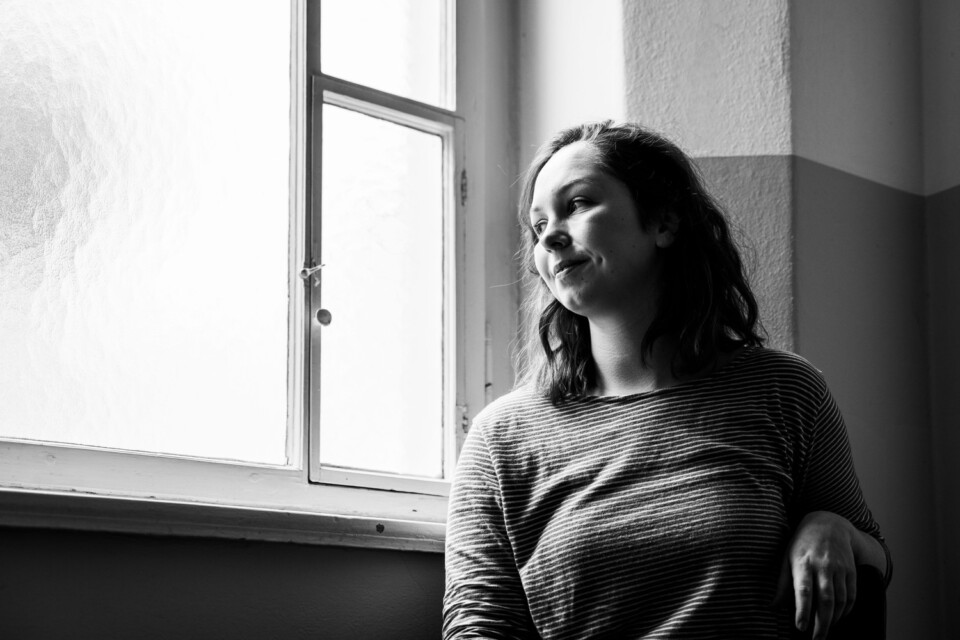N O R A
Berlin | 2020

N O R A
City — Berlin
Name — Nora
Age — 25
Love life — Boyfriend for 2.5 years
Profession — Marketing & Sales at Deutsche Oper Berlin
Years in Berlin — All her life
Location — Her apartment
T H E B E R L I N S T O R I E S
‘I FOUND
MY VOICE
AND I TRY
TO SPEAK UP’

- What makes you happy? “Silence, and calm days. Life can be very stressful and my head is always full. I’m constantly running from one thing to the next. Work, friends, relationship, study… they all require my attention. This pressure to get everything done is exhausting. I want to be a good friend, girlfriend, daughter, student and colleague, but I’m not always good to myself. So when I have a rare moment alone, it feels extra special. I need breaks like that to bring it all into focus. Do I need to feel stressed all the time? Am I being the best friend/girlfriend/colleague/child? In group situations, I’m always the happy one. Bubbly, telling the jokes, and keeping the conversations going. But I now recognise that it’s exhausting for me. Often I no longer think, ‘Wow, that was a great evening’, I’m just happy to finally be going home. During alone time I recharge. I’m working on communicating that I have to choose myself sometimes and I cannot be there for everyone all of the time. So being at home doing completely nothing, lying in bed watching Netflix, makes me really, really happy. Just a little bit of silence and me-time.”
- What is your best personality trait? “That what also makes me suffer the most: I always want to do everything right for others. For me it’s very important that everybody is happy and fine with me. I’m a pretty good listener and good at helping others. Most of the time I place their happiness above my own and I forget to think about myself. It’s important for me that people know I’m a good person. I want to give, I’m not necessarily expecting to get the same back.”
- What is your greatest life lesson? “That it’s okay if it’s not okay. I’m learning to say that to myself. It’s okay to want to be alone and prioritise myself, it’s okay to be in therapy, it’s okay to admit that something feels wrong, it’s okay to experience anxiety and burnout. I was always trying to be happy and bubbly and pretending that everything was great, but then I was confronted with my own hell. At home, so many negative thoughts would go through my head. It resulted in staying away from other people and even from myself. I guess the life lesson here really is to be more honest with myself and others. If you’re speaking your truth, others have a better chance of getting to know the real you. I guess part of the problem is that we’re living in this world where everybody seems to be okay and there is so much pressure to live this perfect life. You need a lot of inner strength to accept that things are fine the way they are. It saves you a lot of sleepless nights.”
- What is your biggest struggle? “I’m really insecure that I get things wrong. I want to be above reproach. I have this fear of disappointing or hurting others because I was thinking too much about myself. I cannot sleep because of all those thoughts and insecurities and they make me feel stressed.
I’m trying to work on it in therapy. I already found out that those insecurities have their origin in my childhood. My parents, grandparents and great-grandparents were all musicians, so there always was this pressure of, ‘You have to be really good at what you do, if you want to make a career out of it.’ So I’ve always been trying to be the very best at what I do. It’s difficult to unlearn this in therapy, because I’m very close with my parents – they are my best friends and I really like being their child ¬– but I have to separate myself from them. My mom is my hero, so it’s hard to realise that maybe not everything in my childhood was perfect. Now I’m wondering if I actually want to be like them, or if I was simply living up to their expectations and perhaps see things differently.”

- What makes you different than other people? “That I’m really good in getting things done by myself and being happy about it. My parents call me a Polly Patent. This story by Astrid Lindgren is about a young girl who is raised by her grandmother. The grandmother falls ill and this young child saves Christmas for the whole family, all by herself. So my mom always calls me a Polly Patent, because I’m so independent and I can do anything. She felt she never had to worry about me. And it’s true, everything in my life is always working out as it should. I feel happy that I don’t have to try very hard, that I can just do what I want and still have time to help others.”
- What is your greatest dissapointment? “When I was a young girl and I was learning about World War II at school, I remember thinking: Wow, I’m so glad that I don’t have to live in a world where there’s war. Of course then I found out that there are still wars going on, only not in my privileged life and in my country. And BOOM… suddenly you become an adult and you realise that the world is full of problems and conflicts. I miss the times when I was a naïve child who could just be happy and didn’t have to worry about a thing. It feels like I lost my innocence back there and then.
A similar thing happened when I moved to the Eastern part of Germany for an apprenticeship at a restaurant awarded with a Michelin star. My family is very tolerant and I didn’t know there was any other way of thinking. The kitchen staff were constantly on my case about coming from Berlin. They said that they could never live there, because it’s disgusting that there are so many people from other countries. Most of them listened to racist rock music. I was just 17 at the time and I was in shock that people would say things like that, with such conviction. People I had to work with every day. It made me realise that there are still people hating others. It’s a huge problem.” - What is your greatest fear? “That globally things might be getting out of control; the climate crisis, politics in Germany and the US. With regards to my own little bubble, my greatest fear is to remain feeling rushed my entire life. That there will never be a point when the dust settles, that I will always have thousand-and-one things running through my mind. But my biggest fear is for the world. Although I should stop thinking too much about it, because I’ll go down the rabbit hole and become depressed and sad. So I’m trying to be afraid only of things I can change. The world’s problems are too huge for me to handle.”
- What is the best advice anyone ever gave you? “Probably a bit sad, because it was, ‘Nora, your colleagues are not your friends’. Some people are just co-workers and that’s fine. I totally needed to hear that, because I was trying to make everybody happy and that didn’t work out, of course. It only made me feel sad for putting in so much effort without result. From that point on I started to change my priorities.”
- What advice would you give other women? “Help each other and be honest about what’s happening. Especially when it comes to topics like sexual harassment. I’m afraid that there are so many women out there who are not being heard or taken seriously. I really wish we would listen to each other, without blaming the victim.
I blamed myself when it happened to me. I was working in that Michelin restaurant in Eastern Germany and I was the only woman in the kitchen. I was 17 at the time and these men were 40, 50 years old. They would ask me all kinds of inappropriate questions, like, ‘What’s your favourite position, what toys do you use at home?’ And if I had to work until midnight, they would not go home after their shifts, but sit there and watch me clean the kitchen. I didn’t realise it at the time, but I should have said something. Except I was the only woman there, and I felt so small. I felt that I wasn’t in a position to speak up. And I don’t think even going to my supervisor would have changed anything. The kitchen chef was the one with all the power. So I decided to quit the job.
It can be very difficult to decide for yourself whether you were sexually harassed. I kept wondering: was it something I did, was it my fault? I must have sent the wrong message, or given the wrong signal. It changed my approach in certain situations. I’m constantly afraid of giving off signals that can be perceived incorrectly, so I’ve become more careful. I’m sorry that I didn’t speak up for myself. I was afraid to ruin the relationship with the chef.
Because of this experience, I would advise other women to be loud and clear, to be straightforward, to be strong and to speak up for themselves. If you feel uncomfortable, say it, right then and there. Because if you wait until afterwards, sadly nothing will change. These days, I’m strong and outspoken. I found my voice and I try to speak up; for myself but also for other women if I see something wrong. And luckily my passion for food is still there.” - What does Berlin mean to you? “Coming from a family of musicians and working in the Opera House, Berlin represents art to me. There are so many theatres, cultural events, museums and concert halls, and what they offer is so diverse. There’s something going on every day of the week, there are unlimited options. And I like that this art scene attracts people from all over the world. Berlin is a liberal city. Here, you can be who you want without being judged. Although that same liberty puts pressure on me to optimise myself. Should I be enjoying life more, making the most of this freedom?
I do think there is an image of a typical Berliner woman. Someone who goes to techno clubs and is part of this open-minded scene. But Berlin has many different districts and people, and there’s such a huge cultural diversity, that there really isn’t one stereotypical Berlin woman. For me and my friends from South West Berlin, tolerance and open-mindedness are typical characteristics. But that is just in my bubble, I don’t think that represents the rest of Berlin. Maybe that’s what makes it so special. That everyone has their own Berlin.”
Photos by Luís Luz

